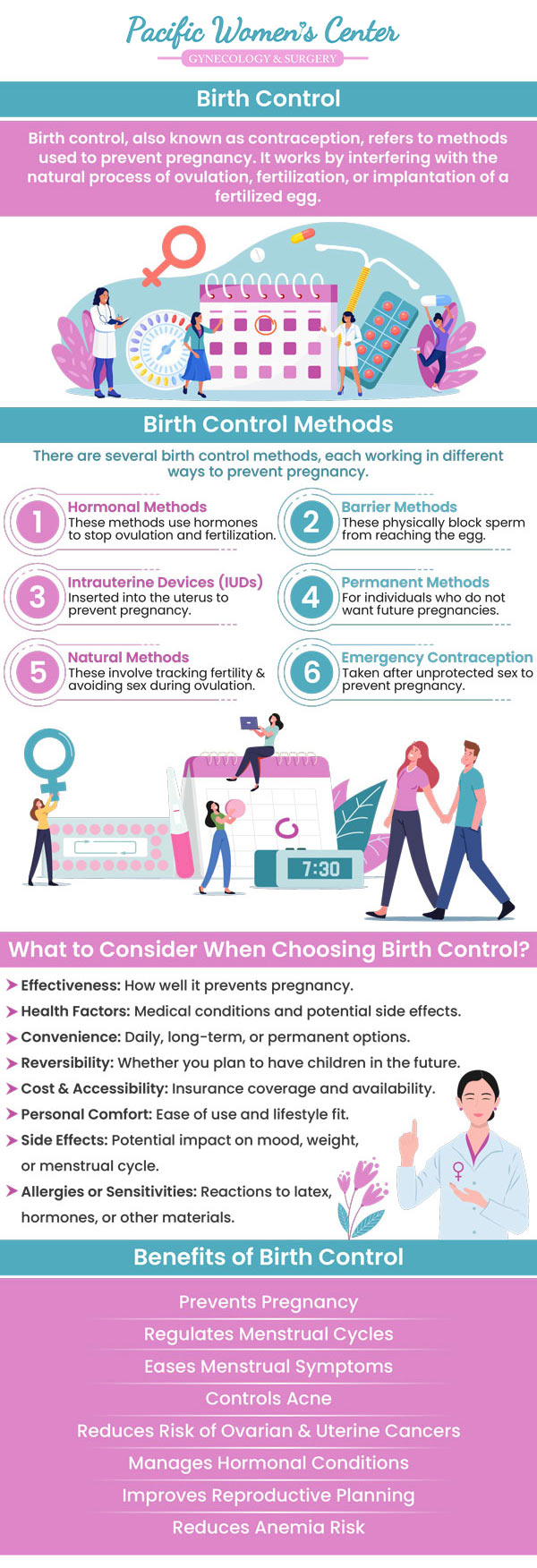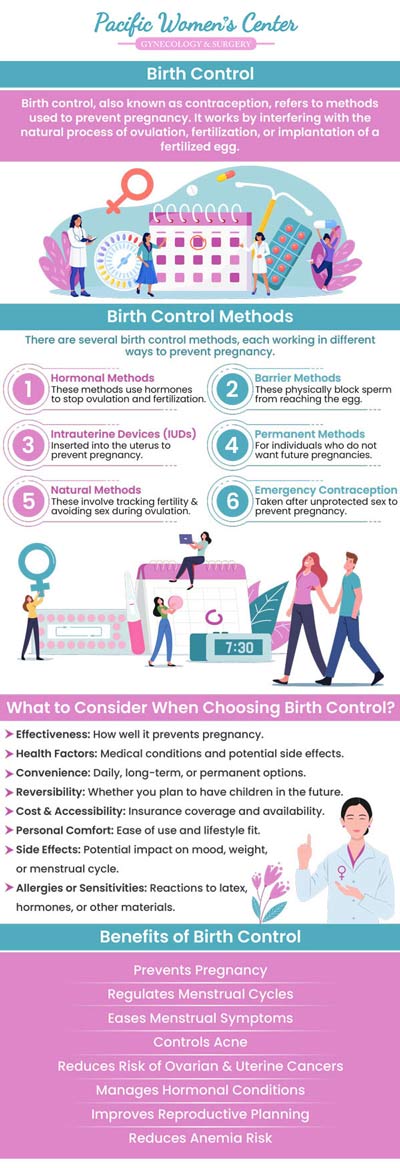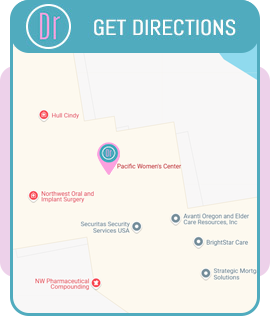Contraception and Birth Control Methods in Eugene, OR
At Pacific Women’s Center, we empower you with comprehensive contraceptive options, including IUD birth control. Our team is dedicated to educating and supporting you in making informed decisions about your reproductive health. IUDs offer effective, long-term protection, fitting seamlessly into various lifestyles. Dr. Richard Beyerlein MD, CPI, FACOG, and Tamara A. Stenshoel, MD, FACOG will help you achieve your health and wellness goals with confidence and care. For more information, please contact us or schedule an appointment online. We are located at 911 Country Club Rd. Suite 222, Eugene, OR 97401.




Table of Contents:
What are the different types of contraception in gynecology?
How effective is IUD contraception in preventing pregnancies?
What are the benefits of IUD contraception?
What contraceptives protect against sexually transmitted diseases (STDs)?
Who is a good candidate for IUD contraception?
There are many different kinds of contraceptives on the market but they all fall into five different categories. When it comes to determining the best contraceptive for you it is worth discussing it with your gynecologist so they can assist you in making the best choice for your unique situation. There are long-acting reversible contraceptives (LARC) which include contraceptives like the hormonal IUD, copper IUD, and implantable rod contraceptive. There are also hormonal birth controls which encompass injectable birth controls, progesterone-only pills, combination birth controls that have both estrogen and progesterone, and the contraceptive patch or ring. Barrier methods also are considered contraceptives as they include diaphragms, male condoms, female condoms, cervical caps, contraceptive sponges, and spermicides. Contraceptives that can be used after intercourse are called emergency contraceptives which include the copper IUD and emergency contraceptive pills (ECP) with the latter not being recommended as a regular-use birth control method.
Surgical interventions are also known as contraceptives in gynecology. Still, these are generally recommended for those who have decided they do not want more kids than they already have, or have determined that they do not want kids. These interventions include tubal ligation, vasectomies, and sterilization implants.
IUDs are touted as some of the best contraceptives on the market for women, and this is because they are 99% effective in preventing pregnancy while hormonal pills are only 98% effective when taken exactly as they are supposed to be with them being normally only 85-89% effective as many women may not take them at the same time daily. Depending on the IUD you have chosen they can be effective for three to 12 years and can give women peace of mind as they do not have to set alarms or reminders to take the birth control daily. You will only need to track how long you have had your IUD to make sure it is replaced when recommended, which takes a lot of stress off of women who choose an IUD over regular birth control methods.
Besides the aforementioned benefits of not having to worry about taking a pill daily, and that they are the most effective birth control on the market there are some other benefits. This birth control works amazingly for women who can not take estrogen medications as they have previously had negative reactions, since the hormonal IUD only has progesterone and the copper IUD has no hormones included at all. Those on IUDs also find that their menstrual cycles will be a lot lighter or they may not have one at all, which can be beneficial for women who experience anemic situations during menstruation, and periods may be less painful overall. They can also be removed at any time by a doctor or trained nurse and you can become pregnant immediately after removal which can be beneficial for women who want to have children but want to wait a specific amount of time before. The two biggest benefits women report is that once it is placed they do not have to worry about it, and they only need to check the strings once a month after their period to make sure that it is still in the correct position and that they can use the IUD after pregnancy while they are breastfeeding unlike some contraceptives available.
Only certain contraceptives are going to protect you against sexually transmitted infections (STIs) and sexually transmitted diseases (STDs) they are mostly barrier methods, specifically female and male condoms, dental dams, and diaphragms, as they prevent any sharing of bodily fluids which is how most STDs and STIs are transmitted. It is still recommended to get tested for STDs and STIs after having intercourse with a new partner, protected or not, as there is still a minor chance of spread if perhaps a condom were to break during intercourse.
IUDs have been recommended for women who have had children before but are also a great option for women who have not had children and even teenage girls. There are very few situations in which an IUD would not be recommended as birth control which can include you have pelvic inflammatory disease (PID), you are currently pregnant, or you have a history of uterine issues not limited to abnormal bleeding or malformation of the uterus.
Contraception is more than just a means of preventing pregnancy; it’s a way to manage your reproductive health and lifestyle needs. Whether you’re looking to plan your family’s future or seeking a reliable method of birth control, we are committed to empowering you with a range of contraceptive options, our dedicated team is here to provide comprehensive information and support every step of the way. For more information, please contact us or book an appointment online. We are conveniently located at 911 Country Club Rd. Suite 222, Eugene, OR 97401. We serve patients from Eugene OR, Springfield OR, Coburg OR, Creswell OR, Cottage Grove OR, Lowell OR, Junction City OR, and surrounding areas.

ADDITIONAL SERVICES YOU MAY NEED
❱ Abdominal Hysterectomy
❱ Bladder Lift Surgeon Q&A
❱ Cervical Cone Biopsy
❱ Colposcopy
❱ Endometrial Ablation
❱ Endometrial Biopsy
❱ Female Sexual Dysfunction
❱ Gynecological Surgery
❱ Gynecology
❱ Hormone Therapy
❱ Vaginal Hysterectomy
❱ Endometriosis Diagnosis & Care



